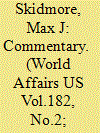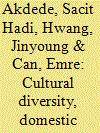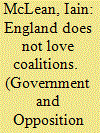|
|
|
Sort Order |
|
|
|
Items / Page
|
|
|
|
|
|
|
| Srl | Item |
| 1 |
ID:
168062


|
|
|
|
|
| Summary/Abstract |
This article directly and bluntly challenges traditional thought by casting aside conventional wisdom regarding the national economy, replacing it with Modern Political Economy and Public Policy. American national policies, I argue, should always, whenever possible, be universal, not targeted toward specific groups. Moreover, policies need to be crafted to achieve their goals, not to fit within budgetary constraints. The least government is the worst, not the best, and a miserly approach to spending is not “wise use of the taxpayers’ dollars.” The national government controls the currency, paying its bills in dollars. It issues dollars as needed, in whatever amount it chooses, and is unrestrained by the need to “find the money” or “pay-as-you-go.” Taxes are useful for purposes of regulation and control of income inequality, but are not relevant to expenditures. “Anything that is technically feasible,” I claim following Kelton and coauthors, “is financially affordable,” and there is no need to fear inflation so long as spending does not exceed the productive capacity of the economy. Despite conventional wisdom to the contrary, and regardless of the widely used jargon of politicians, when government spends, it is not using “The Taxpayers’ Money.”
|
|
|
|
|
|
|
|
|
|
|
|
|
|
|
|
| 2 |
ID:
083238


|
|
|
|
|
| Publication |
2008.
|
| Summary/Abstract |
This study investigates the relationship between cultural diversity, political violence and public expenditures. Using a cross-section of cultural diversity indices, it is empirically examined whether cultural diversity caused or intensified political violence in the 1980s and 1990s. It is found that economic factors were statistically significant in the intensity of the violence in the 1980s, whereas political and cultural factors were significant in the 1990s. In addition, ethnic diversity took a significant role in both starting the violence and the intensity of it in the 1990s.
|
|
|
|
|
|
|
|
|
|
|
|
|
|
|
|
| 3 |
ID:
111676


|
|
|
|
|
| Publication |
2012.
|
| Summary/Abstract |
In mid-2011, it certainly looks as if England does not love coalitions, or at any rate the coalition that is governing it. The phrase was coined by Benjamin Disraeli in 1852. This article begins with the context in which Disraeli spoke, then gradually broadens its scope from England to the UK to the set of advanced democracies. Modern political economy has a great deal to say on the subject of coalitions. In conclusion we return to the prospects for future coalitions and minority governments in the UK.
|
|
|
|
|
|
|
|
|
|
|
|
|
|
|
|
|
|
|
|
|